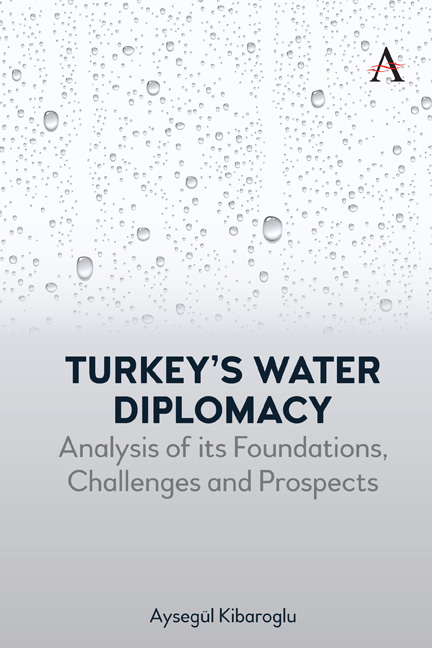Book contents
- Frontmatter
- Contents
- Acknowledgements
- List of Abbreviations
- Introduction
- 1 Institutional Setting
- 2 Water Diplomacy Principles
- 3 Turkey’s Evolving Position vis-à-vis International Water Law
- 4 The Role of History and Geography in Turkey’s Evolving Water Diplomacy
- 5 Analyzing Non-State Actors and Processes in Turkey’s Water Diplomacy Framework
- Conclusion
- References
- Index
3 - Turkey’s Evolving Position vis-à-vis International Water Law
Published online by Cambridge University Press: 24 March 2021
- Frontmatter
- Contents
- Acknowledgements
- List of Abbreviations
- Introduction
- 1 Institutional Setting
- 2 Water Diplomacy Principles
- 3 Turkey’s Evolving Position vis-à-vis International Water Law
- 4 The Role of History and Geography in Turkey’s Evolving Water Diplomacy
- 5 Analyzing Non-State Actors and Processes in Turkey’s Water Diplomacy Framework
- Conclusion
- References
- Index
Summary
Overview
Water law, especially at the international level, has been relentlessly criticized as vague, useless and impotent. Yet, whenever a dispute arises at local, national or international level, water law has often been instantly resorted to as a panacea to lead negotiations to settlements between competing stakeholders. And thus, despite its many ambiguities, the overriding view is that by levelling the playing field for all stakeholders and permitting the consideration of all relevant factors, international water law still constitutes a valuable tool in providing the necessary framework to set the fundamental principles, priorities, approaches and objectives of integrated water resource management at the river basin level (Wouters et al. 2003).
It is generally observed that water diplomacy circles, namely diplomats, legal advisers and decision makers in Turkey have endorsed and adopted customary international water law, particularly its cornerstone principles, that is, ‘equitable utilization’ and ‘no significant harm’. Hence, this chapter first depicts how and to what extent Turkey's state practices follow and contribute to the principles of customary international water law.
Turkey's position towards the Convention on the Law of the Nonnavigational Uses of International Watercourses (hereinafter, United Nations Watercourses Convention – UNWC) has constituted a significant aspect of how its transboundary water policy have been perceived by relevant external actors. It is striking, for instance, that Turkey was one of only three countries who rejected the UNWC in 1997 (Convention 1997). Although the reasons behind Turkey's rejection of the UNWC were officially stated during the Working Groups in New York in 1997, they were never properly elaborated upon in such a way as to reflect its concerns and dilemmas. Hence, it falls to this chapter to shed some light on just these concerns.
It pays to recall in the meantime that since the UNWC vote in 1997, there have been many changes to Turkey's stance vis-à-vis international water law. The chapter will also look into those changes (i.e. the bureaucratic reorganization process) and focus on the evolving position of Turkey vis-à-vis international water law. To illustrate, the main responsibilities of the Water Law and Policy Department, under the General Directorate of Water Management (DGWM) of the MFWA (Ministry of Agriculture and Forestry since 2018), include making studies on national and international water law and legislation, scrutinizing international conventions and leading harmonization efforts with regional and global water law instruments in coordination with the relevant public institutions.
- Type
- Chapter
- Information
- Turkey's Water DiplomacyAnalysis of its Foundations, Challenges and Prospects, pp. 49 - 68Publisher: Anthem PressPrint publication year: 2021

